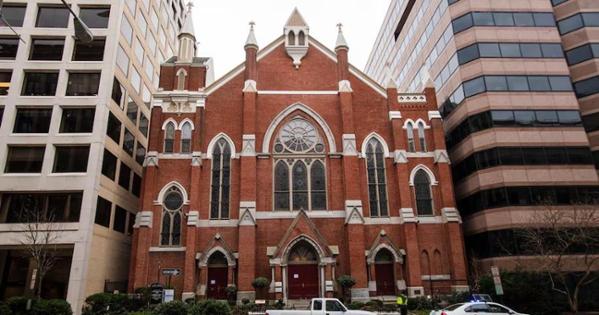Intellectual Property Expert Weighs-in on Recent Court Decision

On Monday, a Washington, D.C. judge awarded the Metropolitan African Methodist Episcopal Church control of the Proud Boys trademark.
The Proud Boys, a far-right militant organization, had previously been ordered to pay the historic Black church $2.8 million after members of the Proud Boys vandalized the church in 2020, but have only paid $1,500 according to the Washington Post.
In response to the lack of payment, a judge gave control of the trademark application to the church. A move that intellectual property expert Professor Christine Farley called “somewhat unprecedented.”
According to Farley, the Proud Boys do not have any registered marks, but they do have four applications for trademarks pending and it is unlikely those can be transferred.
“They could have ‘common law marks’, which are unregistered marks protectable under federal law,” Farley said. “Because the marks are not registered, there may not be clarity about who exactly the owner is and whether the mark is a mark for merchandise or a ‘collective membership mark,’ which is a mark that indicates membership in an association. With a registered mark, these aspects would be clear.”
Farley explained that trademark litigation rarely results in the transfer of a trademark from one party to another.
“The transfer of a trademark from one party to another is not a usual remedy in trademark litigation,” she said. “Domain names are routinely transferred, but not trademarks. This is because the legal protection of a trademark is premised on the trademark conveying that the owner is the source of origin of marked goods or services.”
Farley also noted that when a trademark is assigned to another party, it continues to be protected only if the assignee carries on the business of the assignor in a manner that does not break the continuity of meaning in the mind of consumers.
“Under this rule, transfer a trademark from one entity to an antagonistic entity would cause the trademark to cease to be protectable,” she said. “And when the assignee is antagonistic, that might be a fine result.”
For the Metropolitan African Methodist Episcopal Church, owning the Proud Boys trademark means the group wouldn’t be able to use their branding in advertisements or recruiting, but it is unlikely the church will benefit from control of the trademark.
“A trademark can be a valuable asset, but in this case, it won’t provide any economic value to the Metropolitan African Methodist Episcopal Church because the church won’t use it commercially,” Farley said. “But by owning the mark, the church will be able to legally prevent the Proud Boys from commercially using the mark, so it could hurt the Proud Boys financially if they, for instance, use the mark on the sale of marked merchandise.”
Recently pardoned Proud Boys leader, Enrique Tarrio, has vowed to not follow the court order. Farley says there could be a First Amendment challenge to the court’s decision to transfer the trademark, depending on how the church handles the situation.
“Since trademarks are intangible properties, transfer of a trademark mean that the exclusive rights now belong to the church,” Farley said. “If the Proud Boys use the mark commercially the church could sue them for trademark infringement. This would take time and resources, and it would enable the Proud Boys to challenge the church’s rights to the mark.”